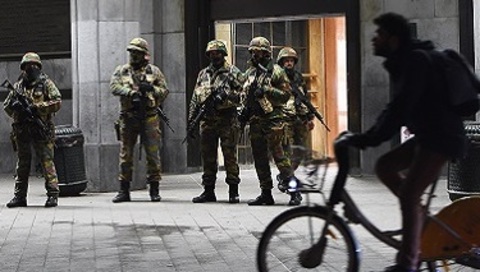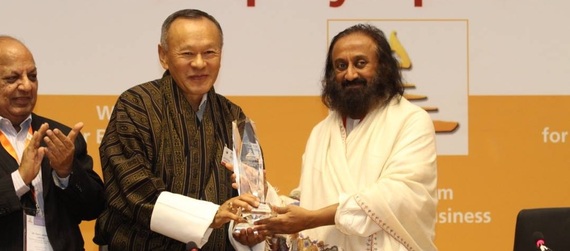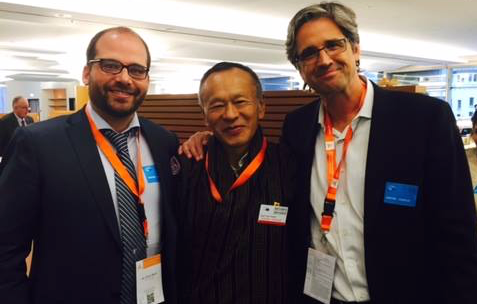
In the wake of the recent Paris attacks, I traveled to Brussels to speak at the World Forum for Ethics in Business at the European Parliament. Upon arrival, I discovered that the conference was cancelled, then reinstated at the insistence of a few Parliament leaders. By the end of the conference, Brussels was on high alert for terrorist activity, and the entrance to the European Parliament we had entered through just hours before was barricaded due to new security concerns, and yet the conference ended up being a huge inspiration for most everyone who attended.
Why would business, political, media and spiritual leaders look to ethics in this time turmoil ?
Ethics can seem like esoteric philosophy debated by academics with little practical consequence, tucked away within ethics codes and social responsibility charters, far from the minds and hearts of decision-makers and stakeholders concerned with the bottom line. It can feel like an obligation, in someone else's expertise or realm of responsibility.
The World Forum for Ethics in Business is a business and political conference convened by global humanitarian and spiritual leader Sri Sri Ravi Shankar. WFEB was created as a platform to connect each of us to our inherent humanity, compassion, dignity and dare to find a new way forward - not as a concept but as a direct experience through coming together in good faith.
"There are four pillars or aspects of society: Business, Politics, Media and Faith-based organizations. They are all working independently, no doubt. But they were in isolation. Certain words, like ethics, were untouchable. If there was a talk on ethics, in many countries, they would would think these ethics are words that are used in places of worship not in business and industry. That sort of untouchability or working in isolation, in compartments was the paradigm few decades ago. I am glad that is changing today. Today, world has realized that we all have to work together because we are all interlinked deep down. And what is it that connects us all? That is ethics." Shared Sri Sri Ravi Shankar in his keynote address.
Isn't it self-evident that people and the planet matter?

The government of Bhutan thinks so. Former Prime Minister of Bhutan Mr. Jigmi Thinley received the Ethics in Business Award 2015. "Growing depression is a sign of emptiness that people feel. We urgently need to reexamine our evolving values." Prime Minister Thinley has brought to life the bottom line of happiness, not just through rhetoric, but in practice and policy. Rather than measuring economic growth in isolation, Bhutan measures its progress using the Global National Happiness (GNH) index, including: psychological wellbeing, health, education, cultural diversity, good governance, ecological diversity, community vitality and living standards. "I am happy to state that 91.2 percent of Bhutanese are happy as per the GNH [Global National Happiness] 2015 survey," Mr. Thinley shared.
"It's absurd that in today's world, you cannot breathe clean air, cannot drink clean water and you don't have healthy food. It's the bottom line of what makes a happy life, a good life, where you can enjoy the beauty of the world and of humanity," shared Jo Linen, Member of the European Parliament. Through the Bretton Woods Conference in 1944, he elaborated, we decided that we could measure happiness, progress and wealth through economic output alone. This no longer holds true in our world today.
I was struck by the simplicity in Mr. Linen's statement. On the heels of COP21 in Paris, it amazes me that we have to build all these constructs to convince ourselves to care about our planet and each other. The cost of not recognizing the absurdity of our single-minded focus on economic output is taking a huge human toll. One recent study cites that 1.6 million people die every year in China due to air pollution.
Reflections for the path forward 
"Being ethical is not a personality trait. It is not a skill. It is a choice," shared Louis Gagnon, technology executive and social entrepreneur. "Unfortunately, too many leaders choose NOT to [act ethically] because they think they can get away with it. They think like that because the negative consequences of being unethical are often diffused, deferred and/or invisible." When ethics shifts from being a moral obligation to arising out of love, it can transition us from avoiding doing harm to actively doing good for people.
As leaders, we can often put aside our hearts to make what we believe are rational and pragmatic decisions. Yet our sensitivity and caring are exactly what have been missing in the way we make decisions. When ethics arises out of a sense of humanity, it can become effortless. It can shift conflict into natural cooperation, cynicism into wonder and make us willing to change our priorities.
Ethics came to life for me in Brussels, and I left energized, curious and more deeply connected to my own values and purpose. As our sense of safety is shaken by fear and insecurity, we can either erect walls to protect ourselves, or we can overcome the barricades in our hearts and minds to explore together: What would a thriving, vibrant global community and planet look like? I am inspired and hopeful that with continued attention and courage, together we can bring this seed of possibility into reality.
